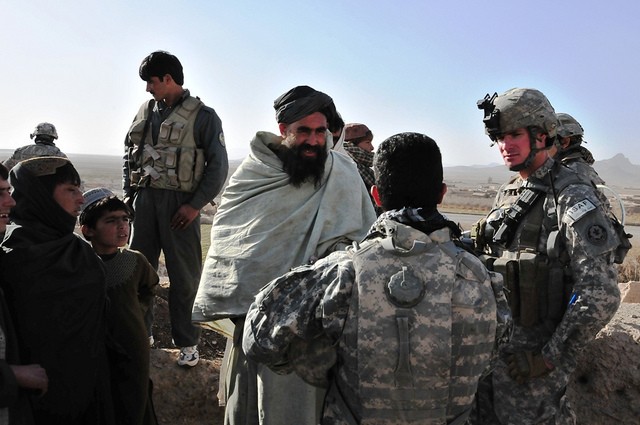
FORWARD OPERATING BASE FRONTENAC, Afghanistan, Feb. 16, 2011 -- In a remote and rural province like Uruzgan, even the smallest presence can have a huge impact on the local population. Checkpoint 18 is one such location where coalition presence has had a positive impact on the local population.
2nd Stryker Cavalry Regiment sends a platoon to the checkpoint spending up to four days at a time, providing security for a paved bridge crossing over the Arghandab river as well as a section of Route Bear, the important north-south route connecting Kandahar and Uruzgan provinces.
"In my opinion, if this checkpoint wasn't here, the insurgents would blow up the bridge." said 1st Lt. Andrew Murphree, the 2nd platoon leader.
"Here at Checkpoint 18 our mission is to provide security and a freedom of movement patrol on Route Bear as well as working in partnership with the Afghan National Police. The locals enjoy the security the checkpoint provides," Murphree added. "Not only do we secure the bridge, but we secure the market as well, which is their only means of commerce. So, they appreciate us being here."
At Checkpoint 18, the mountains to their left and the river behind them aren't the only things surrounding the Soldiers from 2nd Platoon of Outlaw Troop. The insurgents are out there too.
For all the security and relative stability in the area surrounding Checkpoint 18, it's a dangerous place.
"Right out there behind that mud wall is where they fired from last time we took contact," said Sgt. Walter Lau Hee, a squad leader with 2nd platoon, who points to a mud wall about 15 feet from the entrance to an orchard just outside the base perimeter.
"They used the orchard to cover their advance and the wall for protection when we returned fire," Hee recalled.
The ever present danger highlights the need for a strong local security presence.
2nd Platoon routinely works with the local offices of the Afghan National Police, conducting partnered patrols and training the officers to provide an independent security presence in anticipation of the day when there are no U.S. or coalition forces in the area.
"We have a good relationship with the (Afghan National Police)." Murphree said. "I have a lot of respect for the ANP at the northern checkpoint just up the road from here and I look forward to working with them in the future."
To that end 2nd platoon, as part of its four-day rotations to CP 18, visits the ANP checkpoints within their area of operation. During this rotation 2nd Platoon takes in the view from the ANP outpost high above the Dahla Damn, a climb that requires the agility of a mountain goat to get to it.
The platoon inspects the progress on new construction at the outpost, necessitated by a fire weeks before. The checkpoint commander is eager to show Murphree the improvements being made. But the improvement that 2nd platoon want to concentrate on the most during their circuit through the area is in how the ANP conduct themselves.
"We've conducted more missions and they (local ANP) know how we operate," Murphree said. "For the future I hope that we can get them to eventually work on their patrolling."
The time that Murphree and his Soldiers have for training this particular group of ANP is growing short. His platoon, along with the rest of the Squadron will soon move to another province to complete their year-long deployment to Afghanistan, leaving the final training of their ANP counterparts to their replacements.
"This area has changed for the better since we got here." Murphree says. "I'm excited about the opportunity to move to a new area and continue working with (Afghan National Security Forces). We just have to train up and continue to train hard for this next phase of our mission."

Social Sharing